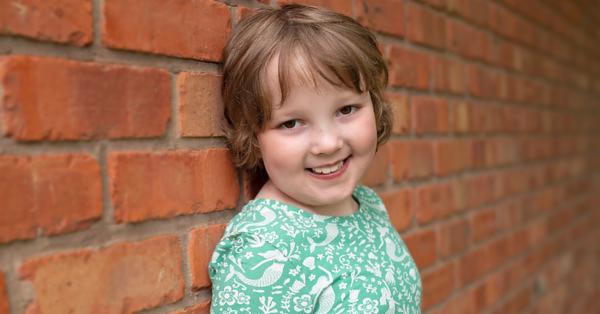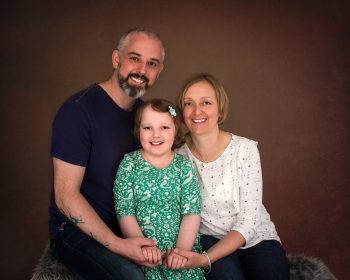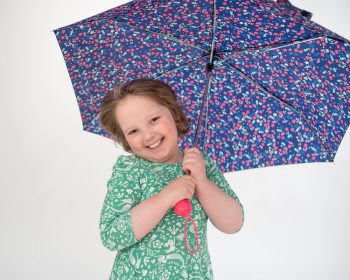
Each morning, 8-year-old Erin Cross springs out of bed excited to go to school. A third grader in Chester, England, she loves science and math, and imagines a future as a researcher making “potions” in a lab. She loves cracking jokes, rugby and playing make-believe games with her friends on the playground. For Erin, who spent most of her life in the hospital and away from others her age, she cherishes each day she is able to just be a kid.
“It’s amazing to see Erin back to living a normal life,” said her mother, Sarah Cross. “We’re so thankful that we’re able to enjoy time as a family doing regular things like taking picnics, playing on the beach or going to the zoo. It’s time that we never take for granted.”
Nearly three years ago, Cross faced the devastating reality that she may never see her daughter grow up. At age 2, Erin was diagnosed with acute lymphoblastic leukemia (ALL). She was able to achieve remission through her initial cancer treatments, but in 2016, her family received the shattering news that she had relapsed and was out of treatment options.
That was, until they found hope in Seattle Children’s Pediatric Leukemia Adoptive Therapy (PLAT-02) chimeric antigen receptor (CAR) T-cell immunotherapy clinical trial for children and young adults with relapsed or refractory ALL who are not likely to survive with current treatments. In July 2016, Erin’s family arrived in Seattle for the trial.
“Seattle Children’s threw us a lifeline,” said Cross. “We knew we had to get her there. We moved mountains to save our daughter’s life.”
A day that will never be forgotten

CAR T-cell immunotherapy is one of the most promising experimental cancer therapies of our time. The therapy reprograms a patient’s own immune system to seek out and destroy cancer without harming normal, healthy cells.
Researchers at Seattle Children’s are also seeing promising results – 93% of patients who had relapsed or refractory ALL in the phase 1 PLAT-02 trial achieved complete initial remission. About 50% were still in remission one year after therapy. Some patients are still in remission years after receiving the treatment.
Erin is one of those patients.
Erin and her family just celebrated an important milestone – the two-year anniversary of her being cancer-free. This significant day also marked the anniversary of the most important call Cross ever received.
“It still gives me goosebumps just thinking about it,” said Cross. “I was in the kitchen when the phone rang and I was terrified to answer it to learn whether or not the treatment had worked. My heart was pounding so hard I could hardly hear the nurse on the phone. I couldn’t believe it when she said Erin was in remission! From being told nothing else would work for Erin, to hearing she would now have a future – it was amazing.”
To honor and remember the special anniversary, Erin and her family had a photo shoot, which Cross said Erin enjoyed as she loves the spotlight.
“There were definitely happy tears,” said Cross. “Looking back, I don’t know how we got through it all, but it’s incredible we are where we are today, stronger than ever.”
Global collaboration fuels faster innovation
It’s patients like Erin, along with the other 10,270 children from birth to 14 years of age who are diagnosed with cancer each year, who spur Seattle Children’s researchers to continue to improve T-cell immunotherapy with the goal of long-term remission for all patients.
“It’s astounding to look back over the past few years and see how far we’ve come in developing CAR T-cell immunotherapy,” said Dr. Mike Jensen, a pioneer in cancer immunotherapy and director of the Ben Towne Center for Childhood Cancer Research at Seattle Children’s Research Institute. “We now have seven cancer immunotherapy trials open at Seattle Children’s for a variety of cancers from leukemia to solid tumors, and we will soon have several clinical sites around the globe offering this promising therapy to patients in their own communities. But most importantly, it’s an inspiration to see amazing patients like Erin who are cancer-free years after receiving the therapy and able to live their lives. It’s the reason why we do what we do, and the reason why we won’t stop working until this therapy becomes a cure for all patients.”
Seattle Children’s also believes that in order to revolutionize this treatment for pediatric cancer, children’s hospitals must work together and share key learnings to achieve better treatments and outcomes for children.
This is why on Oct. 12, Seattle Children’s is convening the world’s leading clinicians, scientists, researchers and philanthropists in London at the Innovations in Pediatric Healthcare Conference, which goes through Oct. 14. Other participating hospitals include Great Ormond Street Hospital, Children’s National Health System, Rady Children’s Hospital-San Diego, and UCSF Benioff Children’s Hospitals.

And the stars of the day – Erin and her family.
“Erin and all of the other kids who have participated in this emerging treatment are helping the world realize the promise it could hold,” said Cross. “We’re proud to share our story and advocate for the development of this therapy, especially in our own country, because it would be out of this world for all kids to someday have access to this treatment in their own community.”
Cross added, “Erin is also really excited to see Dr. Jensen again because she really looks up to him, especially now that she herself wants to be a scientist.”
So through the power of collaboration, what may the future hold for childhood cancer treatment? T-cell immunotherapy could be offered to newly diagnosed patients, greatly reducing the need for toxic therapies and minimizing the length of treatment from months or years, to only weeks. Just imagine if kids with cancer didn’t miss out on key moments in their childhood because of treatment. Imagine if they were able to just be kids.
If you are interested in supporting the advancement of immunotherapy and cancer research at Seattle Children’s, please visit our donation page.

